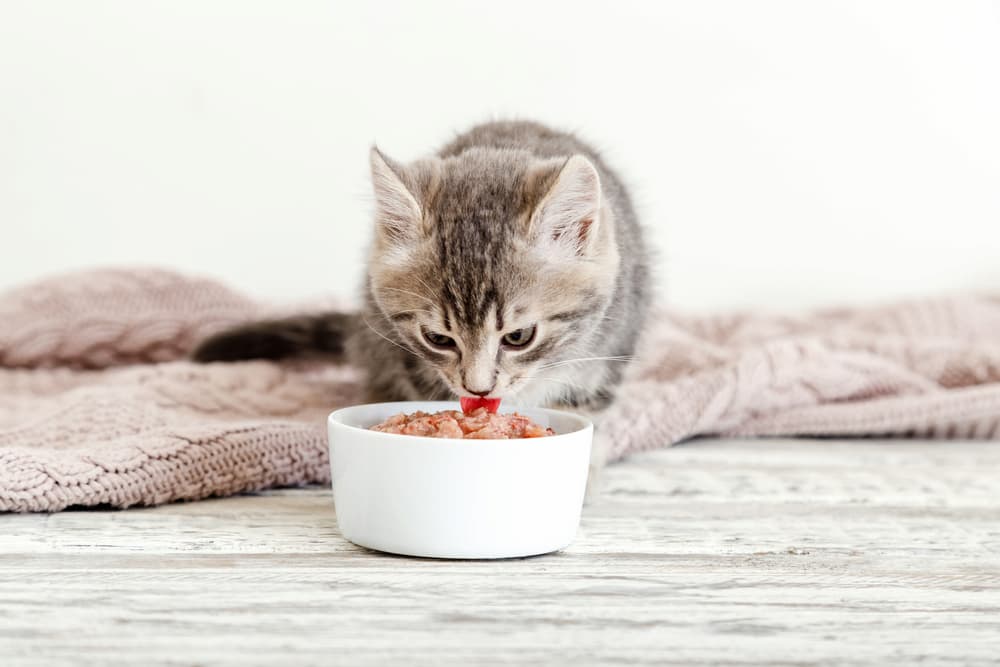Why Do Cats Knock Things Over?

It’s an age-old question, one that humans have asked since felines first sauntered into our homes and our hearts: Why do cats knock things over?!
Books, reading glasses, cups of water, vases – you name it, a cat will gleefully swat it right on the floor where it “belongs.” Oh, sorry (not sorry)…were you reading that? Not anymore. Fragile, you say? Let’s just see about that. Expensive? Even better.
While perfectly normal behavior, “cat batting” can be perplexing and maybe even irritating. Here’s the good news: Once you understand your cat’s motivation, you’ll understand more about your companion’s natural instincts and daily needs.
Why Do Cats Knock Things Over?

So, why do cats push things off tables? There are a number of reasons, ranging from natural predator instincts to stress or bored housecat behavior.
Prey Drive
Today’s felines enjoy pampered pet status, but they are descended from wild, natural-born hunters who were always on the prowl for the next meal. Small objects, especially those with interesting textures, can trigger your cat’s curiosity and hunter history, says Dr. Paula Simons, DVM, a veterinarian and cat parent to Moo and Kal.
“Cats are natural predators and are often looking for ‘prey’ objects,” she explains. “Touching and swatting items is their way of exploring these objects out of curiosity.”
Fun
Why do cats like to knock things over? No need to overthink this one – knocking things off tables (and bookshelves and countertops and mantels) is just plain fun. There’s no malice behind the behavior, even though it may appear naughty by human standards.
“The stereotype of cats being mischievous might add fuel to this notion that they’re up to no good with their actions. In reality, they’re just curious beings having fun,” says Dr. Alex Schechter, DVM, a New York-based veterinarian. “Cats love to play and explore their surroundings, and knocking things over might be an inadvertent consequence.”
Attention-Seeking Behaviors
What happens when your cat pushes your mug off the coffee table? Most likely, you look up from your phone or whatever else is occupying your attention. In other words: mission accomplished.
“Cats can definitely learn this is a way to get attention from humans,” says certified cat behaviorist and fear-free trainer, Katenna Jones, CCBC.
“Typically, this occurs when a cat just happens to knock something over experimentally, and the human responds,” she explains. “The cat only has to repeat this once or twice more to establish a pattern.”
Boredom
Sometimes, the sound of trinkets crashing to the ground can indicate boredom. Without sufficient enrichment and entertainment, cats will attempt to make their own fun – often at the expense of your bookshelf knick-knacks.
“Boredom can cause a cat to knock things over,” says Dr. Schechter. “Cats are naturally curious and active animals. If they lack stimulation, they may become bored and start engaging in undesirable behaviors, such as knocking things off tables or shelves.”
Many housecats experience boredom, and just as many pet parents are unaware. After all, unlike human children, cats can’t loudly vocalize to let you know in no uncertain terms that they’re sooooo bored.
“Most house cats are chronically under-stimulated, mentally and physically,” says Jones. “Yet, they stoically endure without many significant symptoms.”
Is Your Cat Getting Enough Attention?

As intelligent animals who are keenly attuned to their humans, cats know just how to get our attention. While the occasional attention-seeking swat is perfectly normal and resourceful, the behavior is more concerning when a cat begins to seek out negative reactions.
“Even negative attention can be rewarding for cats,” says Dr. Simons. “They are quick to realize that naughty behaviors will cause you to react to them. Each time they knock off an item and you react to them, this reinforces the behavior, causing cats to repeat the behavior again and again.”
A cat who provokes a negative response is probably not getting the attention they need or want from you. Sadly, they’ll settle for any type of interaction with you, even if it’s unpleasant.
“If the cat is punished for doing the behavior and still does it as a way to seek attention, that is a sign the cat is really bored,” says Jones. “They seek unpleasant attention because it’s better than no attention at all, and that is heartbreaking.”
If this sounds like your cat, it’s time to evaluate your relationship with your pet. Cats are social creatures who form deep bonds with humans and need consistent, interactive quality time with their caretakers.
“Schedule regular one-on-one playtime with each cat in your home,” says Jones. “I advise just assuming your cat could use more entertainment. Use a variety of toys in different textures and sizes.”
Jones also recommends clicker training as a fun way to strengthen the human-animal bond, one that provides valuable mental stimulation and physical exercise for your feline friend.
How to Stop Cats from Knocking Things Over

Cats knocking things off tables can be frustrating. Fortunately, there are a number of ways to deter this unwanted cat behavior. But first things first: Never attempt to punish your cat, either verbally or physically.
Cats live in the present, and by the time you react to the fallen object, they’ve already moved on to the next item of business. “Punishment will not correct the behavior,” stresses Jones. “Human timing is far too slow.”
Instead, a far more effective strategy is to supply your pet with plenty of enrichment opportunities that are more interesting than the objects on your desk. In addition to scheduled play sessions, Jones suggests incorporating the following items and sensory experiences into your home:
“Hunting” opportunities: Place a birdfeeder within view of your cat’s favorite window, or consider a (cat-proofed) fish tank to satisfy your cat’s prey drive. If real potential prey is hard to come by, you encourage stalking and chasing behavior with toys like laser pointers or feather wands
Enriching sounds: For cat-friendly sound enrichment, consider playing music composed specifically for cats, or playing bird sounds on YouTube.
Scratching posts: Scratching is a natural instinct for cats, so be sure to supply a high-quality scratching post, as well as additional scratch-friendly toys with interesting textures, such as corrugated cardboard.
Puzzle toys: Treat-dispensing toys, like the Catmosphere Treat Ball or BUSTER Soft Cube, are a fun way to challenge your cat while turning mealtime into playtime.


With these cat-friendly enrichment upgrades, fewer things will end up on the floor. And even more importantly, your cat will enjoy a more exciting and fulfilling day! Now that’s what we call a win-win.









